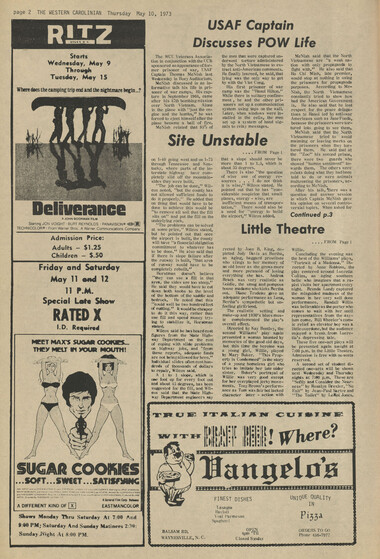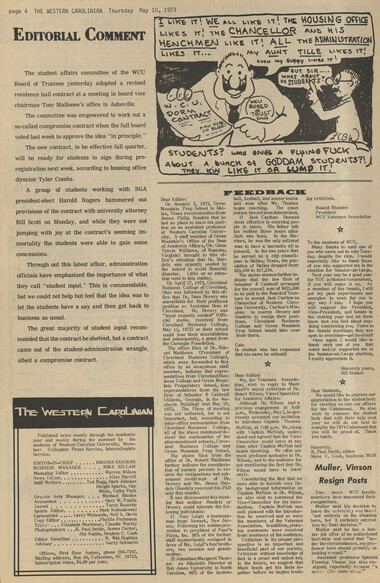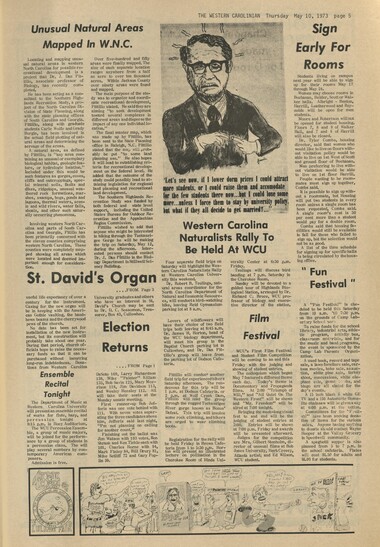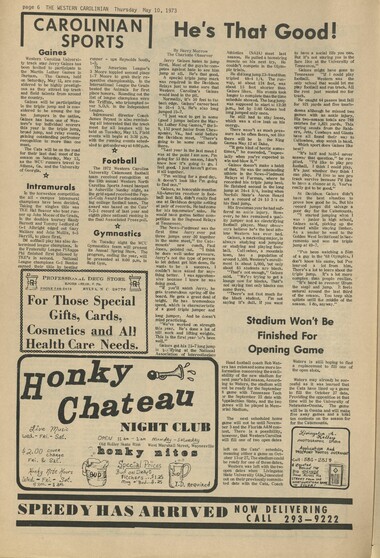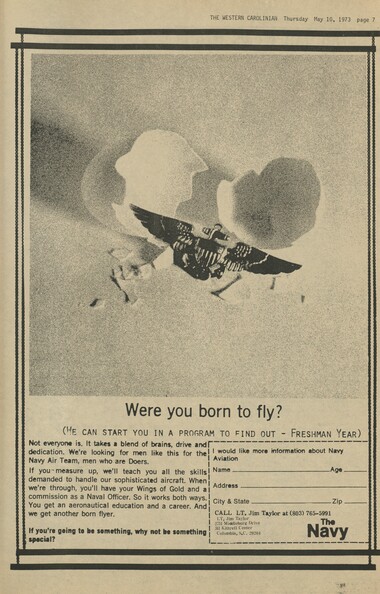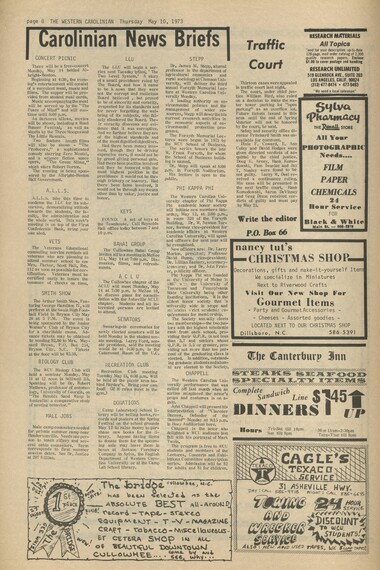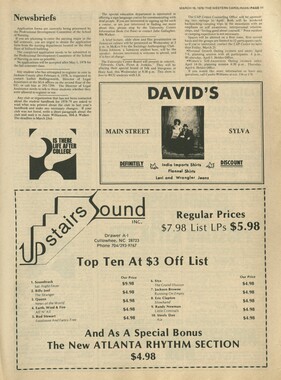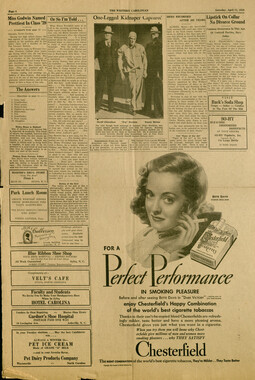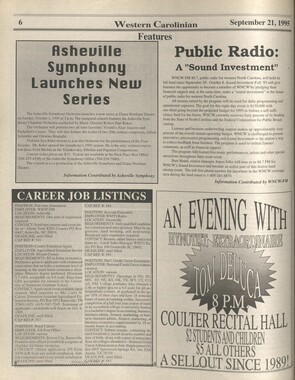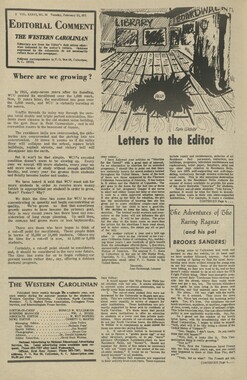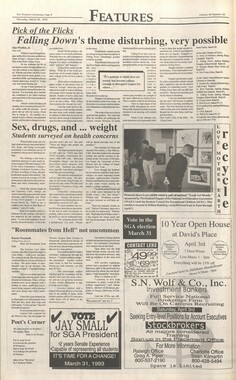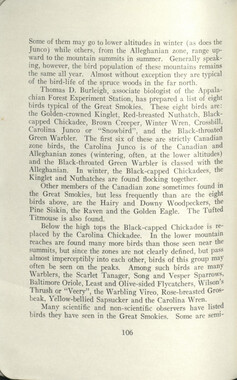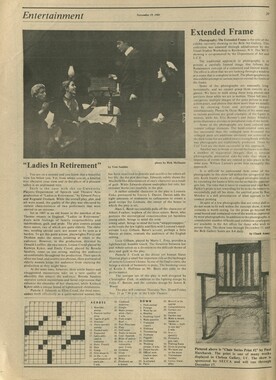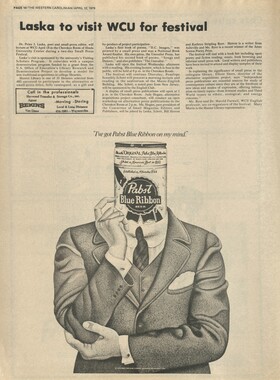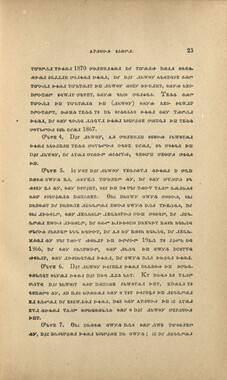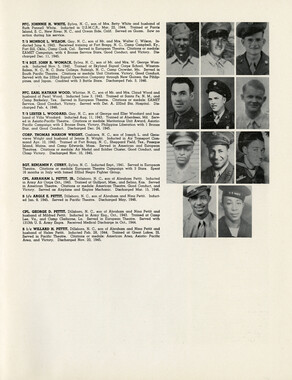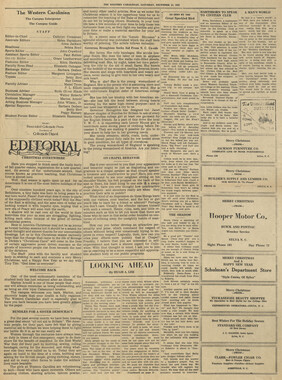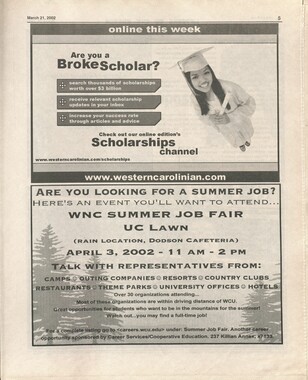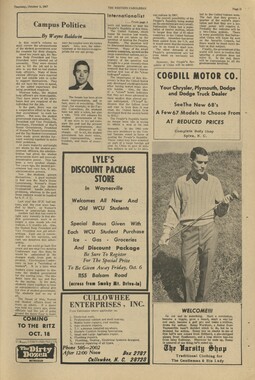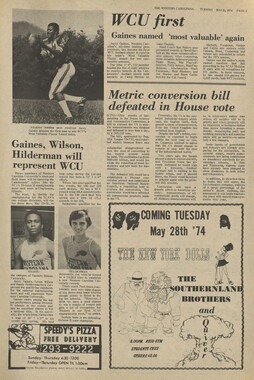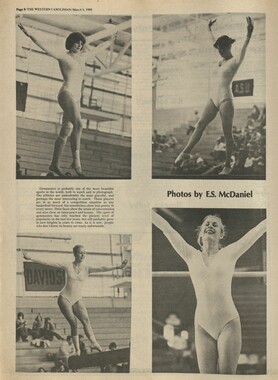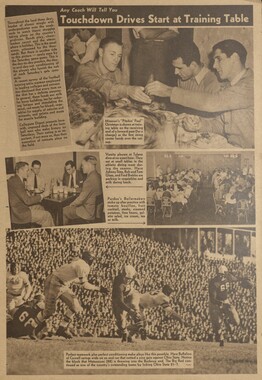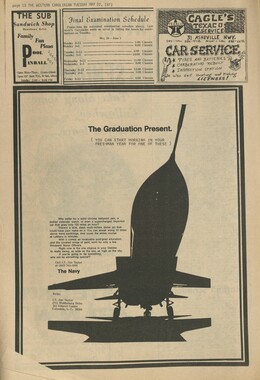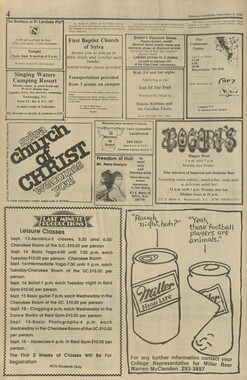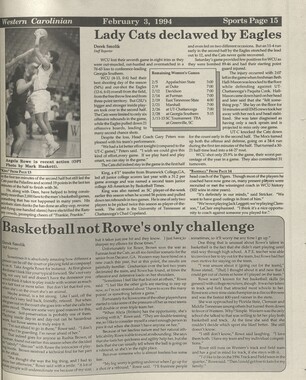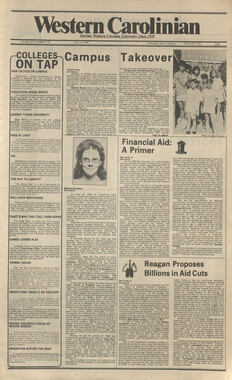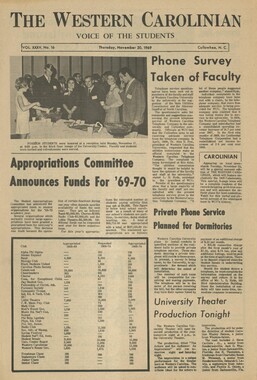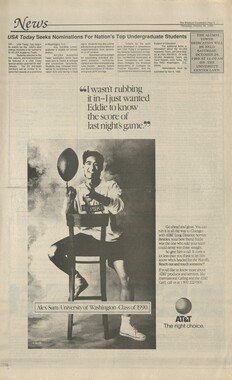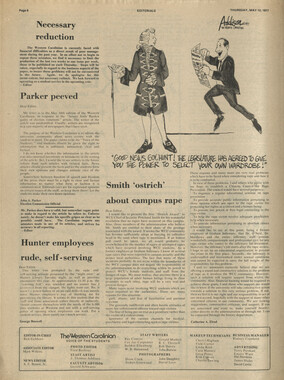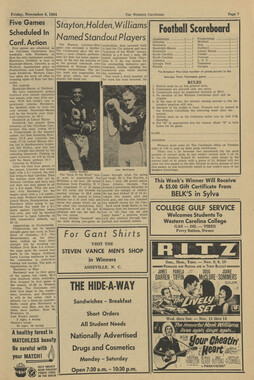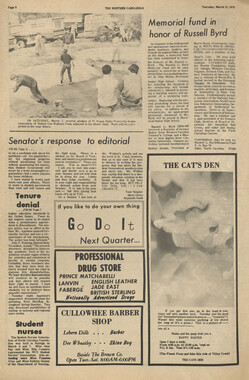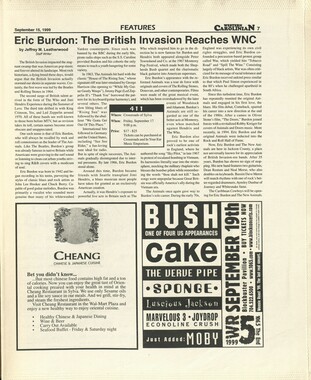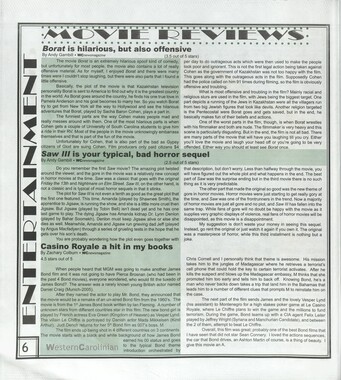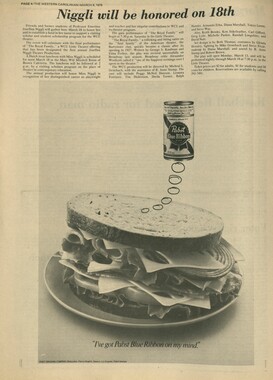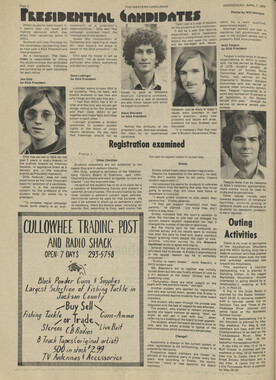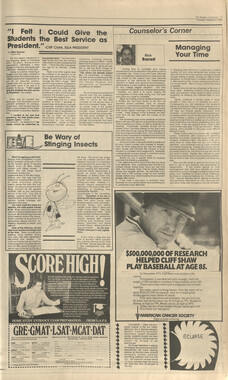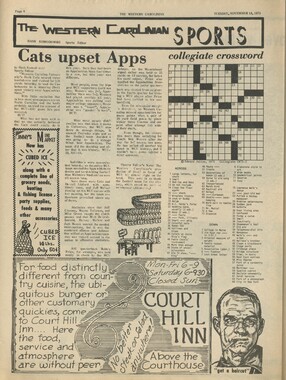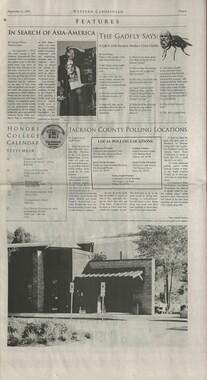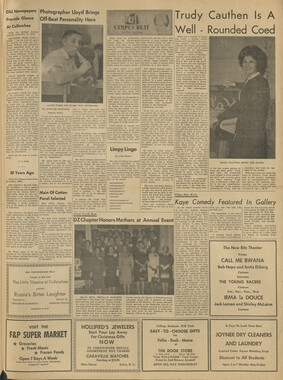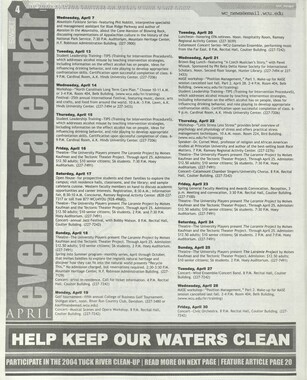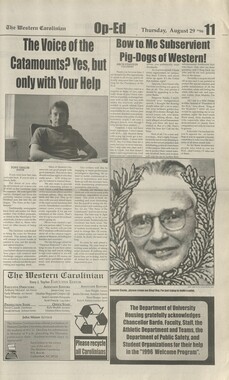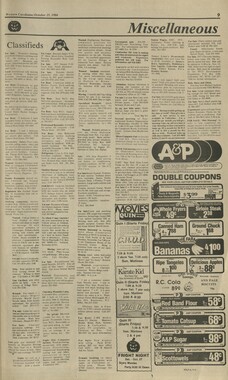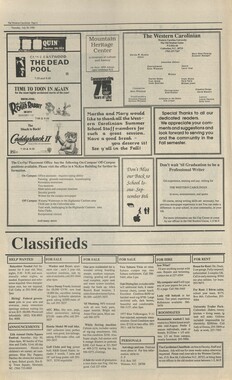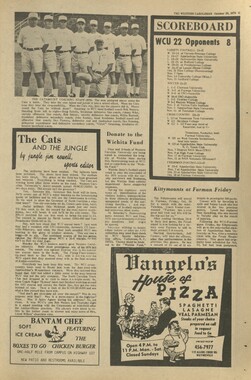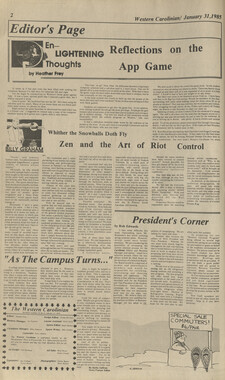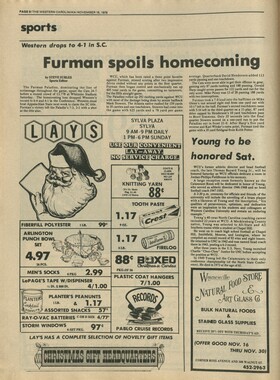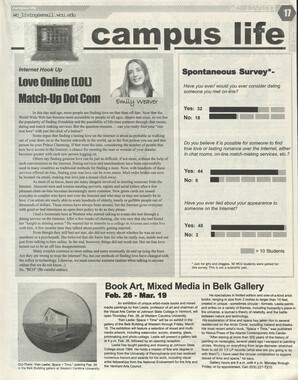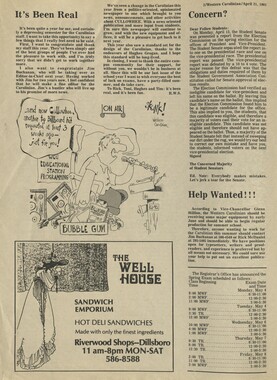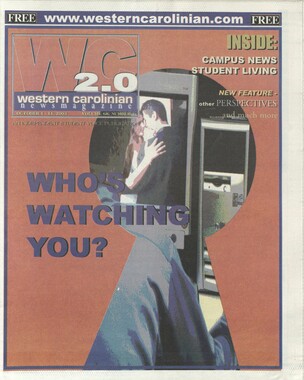Western Carolina University (21)
View all
- Canton Champion Fibre Company (2308)
- Cherokee Traditions (291)
- Civil War in Southern Appalachia (165)
- Craft Revival (1942)
- George Masa Collection (137)
- Great Smoky Mountains - A Park for America (3080)
- Highlights from Western Carolina University (422)
- Horace Kephart (973)
- Journeys Through Jackson (159)
- LGBTQIA+ Archive of Jackson County (89)
- Oral Histories of Western North Carolina (318)
- Picturing Appalachia (6617)
- Stories of Mountain Folk (413)
- Travel Western North Carolina (153)
- Western Carolina University Fine Art Museum Vitreograph Collection (129)
- Western Carolina University Herbarium (92)
- Western Carolina University: Making Memories (738)
- Western Carolina University Publications (2491)
- Western Carolina University Restricted Electronic Theses and Dissertations (146)
- Western North Carolina Regional Maps (71)
- World War II in Southern Appalachia (131)
University of North Carolina Asheville (6)
View all
- Allanstand Cottage Industries (62)
- Appalachian National Park Association (53)
- Bennett, Kelly, 1890-1974 (1463)
- Berry, Walter (76)
- Brasstown Carvers (40)
- Carver, George Washington, 1864?-1943 (26)
- Cathey, Joseph, 1803-1874 (1)
- Champion Fibre Company (233)
- Champion Paper and Fibre Company (297)
- Cherokee Indian Fair Association (16)
- Cherokee Language Program (22)
- Crowe, Amanda (40)
- Edmonston, Thomas Benton, 1842-1907 (7)
- Ensley, A. L. (Abraham Lincoln), 1865-1948 (275)
- Fromer, Irving Rhodes, 1913-1994 (70)
- George Butz (BFS 1907) (46)
- Goodrich, Frances Louisa (120)
- Grant, George Alexander, 1891-1964 (96)
- Heard, Marian Gladys (60)
- Kephart, Calvin, 1883-1969 (15)
- Kephart, Horace, 1862-1931 (313)
- Kephart, Laura, 1862-1954 (67)
- Laney, Gideon Thomas, 1889-1976 (439)
- Masa, George, 1881-1933 (61)
- McElhinney, William Julian, 1896-1953 (44)
- Niggli, Josephina, 1910-1983 (10)
- North Carolina Park Commission (105)
- Osborne, Kezia Stradley (9)
- Owens, Samuel Robert, 1918-1995 (11)
- Penland Weavers and Potters (36)
- Roberts, Vivienne (15)
- Roth, Albert, 1890-1974 (142)
- Schenck, Carl Alwin, 1868-1955 (1)
- Sherrill's Photography Studio (2565)
- Southern Highland Handicraft Guild (127)
- Southern Highlanders, Inc. (71)
- Stalcup, Jesse Bryson (46)
- Stearns, I. K. (213)
- Thompson, James Edward, 1880-1976 (226)
- United States. Indian Arts and Crafts Board (130)
- USFS (683)
- Vance, Zebulon Baird, 1830-1894 (1)
- Weaver, Zebulon, 1872-1948 (58)
- Western Carolina College (230)
- Western Carolina Teachers College (282)
- Western Carolina University (2008)
- Western Carolina University. Mountain Heritage Center (18)
- Whitman, Walt, 1819-1892 (10)
- Wilburn, Hiram Coleman, 1880-1967 (73)
- Williams, Isadora (3)
- Cain, Doreyl Ammons (0)
- Crittenden, Lorraine (0)
- Rhodes, Judy (0)
- Smith, Edward Clark (0)
- Appalachian Region, Southern (3032)
- Asheville (N.C.) (1945)
- Avery County (N.C.) (26)
- Blount County (Tenn.) (195)
- Buncombe County (N.C.) (1680)
- Cherokee County (N.C.) (283)
- Clay County (N.C.) (556)
- Graham County (N.C.) (238)
- Great Smoky Mountains National Park (N.C. and Tenn.) (525)
- Haywood County (N.C.) (3573)
- Henderson County (N.C.) (70)
- Jackson County (N.C.) (4925)
- Knox County (Tenn.) (35)
- Knoxville (Tenn.) (13)
- Lake Santeetlah (N.C.) (10)
- Macon County (N.C.) (421)
- Madison County (N.C.) (216)
- McDowell County (N.C.) (39)
- Mitchell County (N.C.) (135)
- Polk County (N.C.) (35)
- Qualla Boundary (982)
- Rutherford County (N.C.) (78)
- Swain County (N.C.) (2185)
- Transylvania County (N.C.) (270)
- Watauga County (N.C.) (12)
- Waynesville (N.C.) (86)
- Yancey County (N.C.) (72)
- Aerial Photographs (3)
- Aerial Views (60)
- Albums (books) (4)
- Articles (1)
- Artifacts (object Genre) (228)
- Bibliographies (1)
- Biography (general Genre) (2)
- Cards (information Artifacts) (38)
- Clippings (information Artifacts) (192)
- Copybooks (instructional Materials) (3)
- Crafts (art Genres) (622)
- Depictions (visual Works) (21)
- Design Drawings (1)
- Digital Moving Image Formats (2)
- Drawings (visual Works) (185)
- Envelopes (101)
- Exhibitions (events) (1)
- Facsimiles (reproductions) (1)
- Fiction (general Genre) (4)
- Financial Records (12)
- Fliers (printed Matter) (67)
- Glass Plate Negatives (381)
- Guidebooks (2)
- Internegatives (10)
- Interviews (823)
- Land Surveys (102)
- Letters (correspondence) (1045)
- Manuscripts (documents) (618)
- Maps (documents) (177)
- Memorandums (25)
- Minutes (administrative Records) (59)
- Negatives (photographs) (6090)
- Newsletters (1290)
- Newspapers (2)
- Notebooks (8)
- Occupation Currency (1)
- Paintings (visual Works) (1)
- Pen And Ink Drawings (1)
- Periodicals (194)
- Personal Narratives (10)
- Photographs (12977)
- Plans (maps) (1)
- Poetry (6)
- Portraits (4568)
- Postcards (329)
- Programs (documents) (181)
- Publications (documents) (2444)
- Questionnaires (65)
- Relief Prints (26)
- Sayings (literary Genre) (1)
- Scrapbooks (282)
- Sheet Music (2)
- Slides (photographs) (402)
- Songs (musical Compositions) (2)
- Sound Recordings (802)
- Specimens (92)
- Speeches (documents) (18)
- Tintypes (photographs) (8)
- Transcripts (329)
- Text Messages (0)
- A.L. Ensley Collection (275)
- Appalachian Industrial School Records (7)
- Appalachian National Park Association Records (336)
- Axley-Meroney Collection (2)
- Bayard Wootten Photograph Collection (20)
- Bethel Rural Community Organization Collection (7)
- Blumer Collection (5)
- C.W. Slagle Collection (20)
- Canton Area Historical Museum (2110)
- Carlos C. Campbell Collection (462)
- Cataloochee History Project (64)
- Cherokee Studies Collection (4)
- Daisy Dame Photograph Album (5)
- Daniel Boone VI Collection (1)
- Doris Ulmann Photograph Collection (112)
- Elizabeth H. Lasley Collection (1)
- Elizabeth Woolworth Szold Fleharty Collection (4)
- Frank Fry Collection (95)
- George Masa Collection (173)
- Gideon Laney Collection (452)
- Hazel Scarborough Collection (2)
- Hiram C. Wilburn Papers (28)
- Historic Photographs Collection (236)
- Horace Kephart Collection (861)
- Humbard Collection (33)
- Hunter and Weaver Families Collection (1)
- I. D. Blumenthal Collection (4)
- Isadora Williams Collection (4)
- Jesse Bryson Stalcup Collection (47)
- Jim Thompson Collection (224)
- John B. Battle Collection (7)
- John C. Campbell Folk School Records (80)
- John Parris Collection (6)
- Judaculla Rock project (2)
- Kelly Bennett Collection (1482)
- Love Family Papers (11)
- Major Wiley Parris Civil War Letters (3)
- Map Collection (12)
- McFee-Misemer Civil War Letters (34)
- Mountain Heritage Center Collection (4)
- Norburn - Robertson - Thomson Families Collection (44)
- Pauline Hood Collection (7)
- Pre-Guild Collection (2)
- Qualla Arts and Crafts Mutual Collection (12)
- R.A. Romanes Collection (681)
- Rosser H. Taylor Collection (1)
- Samuel Robert Owens Collection (94)
- Sara Madison Collection (144)
- Sherrill Studio Photo Collection (2558)
- Smoky Mountains Hiking Club Collection (616)
- Stories of Mountain Folk - Radio Programs (374)
- The Reporter, Western Carolina University (510)
- Venoy and Elizabeth Reed Collection (16)
- WCU Gender and Sexuality Oral History Project (36)
- WCU Mountain Heritage Center Oral Histories (25)
- WCU Oral History Collection - Mountain People, Mountain Lives (71)
- WCU Students Newspapers Collection (1923)
- Western North Carolina Tomorrow Black Oral History Project (69)
- William Williams Stringfield Collection (2)
- Zebulon Weaver Collection (109)
- African Americans (390)
- Appalachian Trail (35)
- Artisans (521)
- Cherokee art (84)
- Cherokee artists -- North Carolina (10)
- Cherokee language (21)
- Cherokee pottery (101)
- Cherokee women (208)
- Church buildings (190)
- Civilian Conservation Corps (U.S.) (111)
- College student newspapers and periodicals (2012)
- Dams (108)
- Dance (1023)
- Education (222)
- Floods (63)
- Folk music (1015)
- Forced removal, 1813-1903 (2)
- Forest conservation (220)
- Forests and forestry (1198)
- Gender nonconformity (4)
- Great Smoky Mountains National Park (N.C. and Tenn.) (181)
- Hunting (47)
- Landscape photography (25)
- Logging (122)
- Maps (83)
- Mines and mineral resources (9)
- North Carolina -- Maps (18)
- Paper industry (38)
- Postcards (255)
- Pottery (135)
- Railroad trains (72)
- Rural electrification -- North Carolina, Western (3)
- School integration -- Southern States (2)
- Segregation -- North Carolina, Western (5)
- Slavery (5)
- Sports (452)
- Storytelling (243)
- Waterfalls -- Great Smoky Mountains (N.C. and Tenn.) (66)
- Weaving -- Appalachian Region, Southern (280)
- Wood-carving -- Appalachian Region, Southern (328)
- World War, 1939-1945 (173)
Western Carolinian Volume 38 Number 57
Item
Item’s are ‘child’ level descriptions to ‘parent’ objects, (e.g. one page of a whole book).
-
-
VVESTEI^I ELaI^dLiMIAM VOICE OF THE STUDENTS VOL. XXXVIII No. 57 Thursday May 10, 1973 Western Carolina University Cullowhee, North Carolina Returns Alice Harrill was elected editor of the Western Carolinian in the Student Government elections Tuesday. Harrill's 669 votes led all candidates in the day's races. Mike "Painter" Killam gathered 663 votes as he won the business manager's office of the Western Carolinian. Both were unopposed, R. Paul Smith was elected Catamount editor in a closely contested race with PhyllisSni= der. Smith polled 387 votes to 348 for Snider. Steve Cook took business manager of the yearbook with 373 votes as 325 went to Eteivid Penley. In the controversial election for WCAT business manager, "Butch" Davenport swept it a- way from incumbent Fred Jones 431 to 272. Steve Montgomery, who ran unopposed for president of the University Center Board, polled 654 votes as he took the election. Bob Armfield was elected vice president when he out- polled Wayne Sloop 368 to 309. In the senator-at-large contest, Jill Sistare, Betsy Chapman and Roland Johnson polled 450, 360 and 341 votes respectively as they obtained the three seats. Ed Wilson, edged out of the election by an eight-vote margin in receiving 333, has called for a second count of the ballots, The three other candidates, R. Paul Smith, Edwin Holland and Jim Shive received 303, 188, and 119 respectively in rounding out the ballot. In the eight commuter senator seats up for grabs, Joe Digges polled 173 votes, Rick CONTINUED Page 5 . . ... AFT Gets 60 Members The forming local chapter of the American Federation of Teachers have signed "over 60" members, according to temporary chairman, Dr. Allan Grant. Grant, an English professor, indicated last night that the required 20 per cent of the faculty neccessary to get a charter had signed. The union, Grant said, is designed to protect faculty members through collective bargaining, which is currently illegal for state employees, A bill before the North Carolina legislature to legalize collective bargaining was tabled this week when it ran into a controversy. The bill is to be reconsidered in the next session in January. A meeting of the local union has been scheduled for May 21 at 7:30 p.m. in the Forsyth Business Auditorium. Alice Harrill, a junior from Charlotte, led the pack in Tuesday's election and will take over as editor-in-chief of The Western Carolinian in June. Site Unstable For Jackson Airport By Warren Two WCU geology professors, Dr, John Thomas Wilcox and Dr-. Arden W. Horst- man, have expressed negative reactions to the proposed Jackson County Airport project. They base their disapproval on their scientific background and geological studies. Wilcox stated that in Decem- ver 1971 he investigated the proposed site at Berry Ridge, and at that time "expressed concern of slope failure" to Fred Lyda, a former WCU faculty member who at the time was in charge of planning for the airport. In a statement which he sent to Bruce Wike, chairman of the Jackson County Board of Commissioners in February , 1972, Wilcox said "that such a failure is a distinct possibility. Failures have occurred on filled slopes considerably less steep than this one, and I believe that the public is entitled to a thorough investigation of this potential clanger before a commitment to utilize the Berry Ridge site becomes irrevocable." This statement was not included in an environmental impact report to the Environmental Protection Agency. Wilcox said that Wike told him "he could not include it, because it was received after the deadline." Wilcox added that he does not agree with this, and has a Post Office receipt to C. Wilkes prove that the statement was mailed and post marked before the deadline, as he was informed of it. Wilcox noted that "Wike commented that the statements were significant," but said they were just received too late. Berry Ridge is composed of two knobs separated by a depression, or what is called a saddle. The present proposal is to cut the top off the two knobs and fill in the saddle to create a level foundation. Wilcox said "the natural slope there is so steep that the fill has to be . . . two hundred feet high." He went on to express doubt that "they can make that fill without having trouble with it." Arden Horstman stated that in the spring of 1967 he walked over the Berry Ridge site, looked at the rock outcrops and the steepness of the sides of the ridge. "My decision at that time was it was not a good site," he said. Any construction "would be extremely expensive," Horstman reported, because of all the blasting and drilling that would be entailed in the operation. The southeastern United States, which includes western North Carolina, is an area noted for rock slides and slope failure in dealing with construction. Evidence of this can be seen CONTINUED Page 2 . . . . Student Affairs Committee Adopts Housing Contract The student affairs committee of the Western Carolina University board of trustees Wednesday adopted the first WCU housing contract for students who live in university residence halls. The contract, a revision of an earlier version that drew student opposition, will require students who wish to live in a university residence hall to obligate themselves to live there for the entire academic year. Authorization for the committee action was voted by the board last Wednesday after student body president Dwight Nelson strongly criticized a draft contract then being considered by the board. Nelson, who later left the meeting in protest, called the draft contract "completely one-sided." He said a contract ought to be drawn by Wm. E, Scott, university attorney. Little Theatre Presents Tennessee Williams By Alice Harrill The WCU University Players presented a long but entertaining evening of student directed one-act plays last night in the Little Theatre, "The Valiant," a melodrama directed by Mary Bennett, was very effective in portraying the last moments of an unrepent- ing convicted murderer's life. Terry Edwards gave a moving presentation of the anonymous convict who was pursued by thousands as their missing son, brother or lover, Sam Carver's deep-voiced monotone portrayal of the prison warden was effectively reminiscent of old Dragnet programs, and Steve Carlisle was commendable as a priest concerned about the condemned man's soul. The second of the five plays, "Where Have All the Lightning Bugs Gone?," was definitely the highlight of the evening. Directed by Karen Furno, this one-act made a profound statement on pollution, war and loss of innocence and love in today's world. Featuring only two actors and a minimum of stage properties, the play exercised the audience's imagination by changing a park scene into a basketball court, a classroom, a shoot-out and a war scene. John Clark and Vikki Aber- nathy were both commendable in their performances as a boy and girl who meet by accident in the park one day. Especially effective was their pantomime which prevailed throughout the play. The three Tennessee Williams' plays were a little too much for one evening, becuase they all carried the same basic theme of' 'peculiar" women lost in their memories of a former age. It was interesting, however, to see how this theme was presented by each of the directors. "Hello from Bertha," di- CONTINUED Page 2 , . . . Western Carolina University Chancellor Jack K. Carlton later appointed Scott to consult with students and revise the contract. The version that won final approval was prepared by Scott, Nelson, and two other student leaders, Steve Gheen and Harold Rogers, after anopenmeet- ing Monday. Rogers, president - elect of the student body, called the new contract "the best compromise" the group could reach. Rogers said he still does not like the idea of a contract, but said the new document is fairer and more to the point than the earlier version, and that it includes more protection for the student. As contrasted with the earlier version, the new contract: —reduces the breach-of- contract penalty from one quarter's room rent to a flat S100. —guarantees the student occupancy of a particular room. —increases from 48 to 72 the hours allowed a student to vacate a room after withdrawing from the university. —eliminates a clause that would have made students on each floor of a hall collectively responsible for damage to public areas on that floor if individual responsibility could not be determined. Dr. Carlton said the contract is just one step in the process of improving university housing. He said he is committed to working with the Student Government Association toward the development of a comprehensive housing program that would provide a number of option, including the possibility of at least one coeducational hall. Under the plan, other halls might offer varying degrees of inter-hall visitation, and some might offer none, "We will be making a thorough study of a comprehensive housing program," Dr. Carlton said, "with a target date of the beginning of winter quarter." The new contract contains a clause that would permit students to select the type of hall they prefer should such a plan be adopted. Carlton noted that the program would need the approval of the board of trustees. The housing contract goes into effect next fall,
Object
Object’s are ‘parent’ level descriptions to ‘children’ items, (e.g. a book with pages).
-
The Western Carolinian is Western Carolina University's student-run newspaper. The paper was published as the Cullowhee Yodel from 1924 to 1931 before changing its name to The Western Carolinian in 1933.
-


